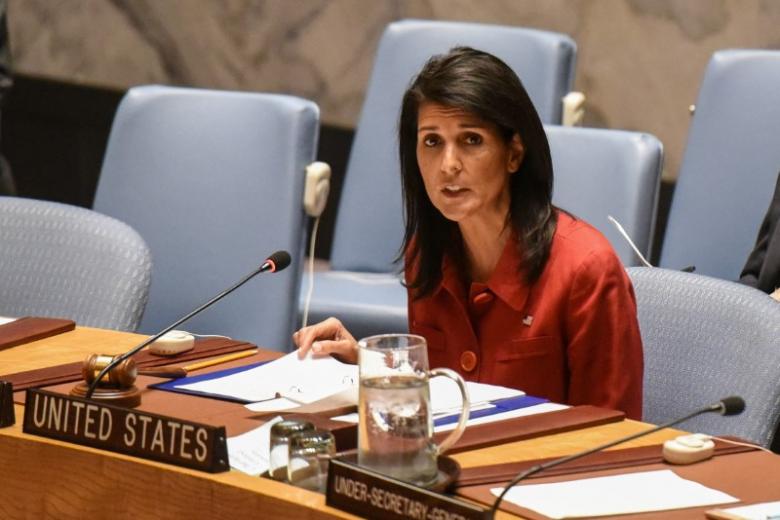The US and UK have again pressed for Russia to detach itself from the long-term stay in power of Syria’s President Bashar al-Assad.
At the UN Security Council on Thursday, US Ambassador Nikki Haley (pictured) called for the focus of “all eyes and all pressure” on Moscow, urging Council action even if it faces a Russian veto.
“They are the ones who could stop this if they wanted to,” Haley said.
Earlier this month, Russia vetoed a Council resolution calling for the Assad regime’s cooperation with an international investigation of the chemical attack on Khan Sheikhoun in northwest Syria on April 4. The firing of a Su-22 jet of a munition, with “sarin or a sarin-like substance”, killed at least 93 people and wounded almost 600.
It was the eighth veto by Russia of a Council resolution since the Syrian uprising began in March 2011.
Russia has vetoed eight resolutions on Syria to shield Assad’s government from action, most recently blocking a council condemnation of a deadly chemical weapons attack that killed dozens of people, many of whom were children. China has backed Russia and vetoed six resolutions.
“I will continue to press the Security Council to act, to do something, regardless of if the Russians continue to veto it because it is our voice that needs to be heard,” Haley told the Council meeting on access to aid in Syria. “Russia continues to cover for the Syrian regime, Russia continues to allow them to keep humanitarian aid from the people that need it, Russia continues to cover for a leader who uses chemical weapons against his own people.”
Deputy Russian Ambassador Petr Iliichev responded that Russia, Iran, and Turkey are working for compliance with a ceasefire to allow delivery of aid — even though Russia has escalated its bombing of opposition areas, targeting infrastructure such as hospitals.
“Neither you nor Western colleagues said a single word about what you are doing to improve the situation,” Iliichev said.
Russia has publicly maintained support of Assad’s line that he cannot be forced to leave by a political resolution; however, some Russian officials have privately said that they are not committed to the long-term future of the President, provided a stable Syrian State remains.


The US is a police state now. Americans should be out in the streets with pitchforks and torches, but instead they would rather shut up, cover their ears, and put their heads in the sand.
Weird.